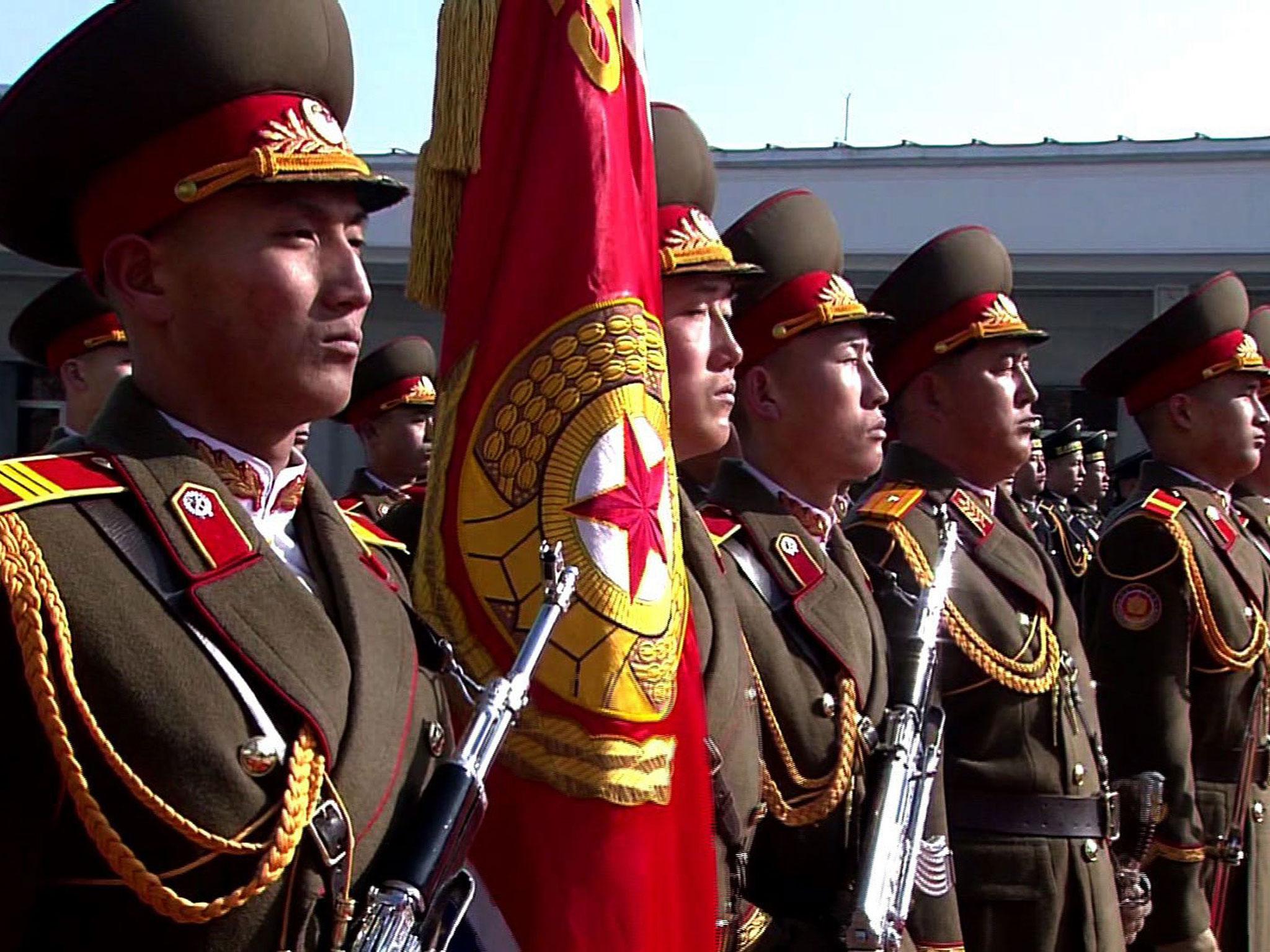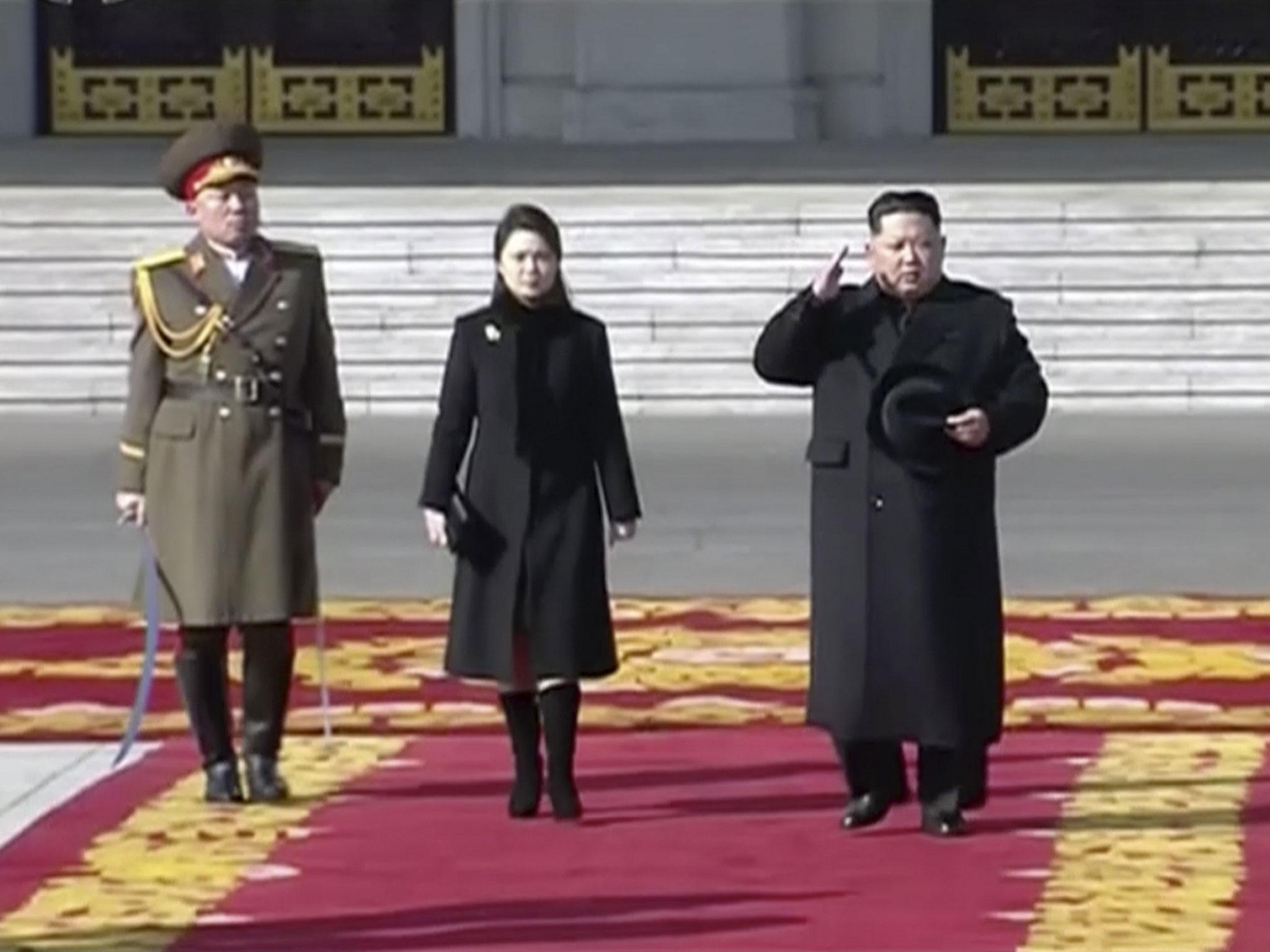North Korea holds military parade on eve of Pyeongchang Winter Olympics in South Korea
Totalitarian state shows off most powerful strategic weapons, including one which could potentially reach deep into the US
North Korea has held a military parade and rally one day before South Korea hosts the opening ceremony of the Winter Olympics.
While the totalitarian state typically broadcasts the occasion live, this year it was shown on state-run television hours after it was over and virtually all foreign media were excluded from the event.
The unusually muted parade was “peculiar” given the North had brought the event forward to the day before the start of the Winter Olympics, John Nilsson-Wright, senior research fellow for North-east Asia at Chatham House and a senior lecturer at the University of Cambridge, told The Independent.
He said he suspected it was “partly because the North may have concluded the Pyeongchang [Winter Olympics] event itself provides them with an unusual propaganda opportunity anyway”.

The parade began with thousands of goose-stepping troops lined up in Kim Il-sung Square to form words and slogans.
Later, North Korea displayed its most powerful strategic weapons, including what appeared to be Hwasong-14 and Hwasong-15 intercontinental ballistic missiles (ICBMs) rolled out on launcher trucks. Analysts believe the missiles, which were successfully tested last year in three launches, could potentially reach deep into the US mainland when perfected.
The parade also featured tanks, armoured vehicles, jets flying over the square in formation to make a “70”, and thousands of people dressed in red, white and yellow creating the letters “Kim Jong-un” in Korean and the ruling Workers’ Party’s symbol of the brush, hammer and sickle.
The North also rolled out what appeared to be a Hwasong-12 intermediate-range missile, which it flew over Japan twice last year as it stepped up the aggressiveness of its weapons tests.
Kim Jong-un, dressed in a long black winter coat, was shown walking on a red carpet with his wife at the beginning of the event.
In a televised speech, he said the parade marks North Korea’s emergence as a “global military power” despite facing the “worst sanctions”.
He called for his military to maintain a high-level of combat readiness against the United States and its “followers” so that the “invasive forces cannot infringe upon or harass the republic’s sacred dignity and autonomy even by 0.001 millimetres.”
“As long as imperialism remains on the Earth and as long as the United States’ hostile policy on North Korea continues, the mission of our military, which is to protect our country and people and secure peace, can never change,” he said.

Mr Kim made no comments about the Olympics in the parts of his speech that were broadcast. The coverage of the parade seemed heavily edited.
North Korea had said it would hold a big event to mark the 70th anniversary of the founding of its military. While 8 February has been seen as a less important founding anniversary, it made something of a comeback in 2015 and was elevated further this year in part because it is the 70th anniversary.
The Olympics was probably also a big factor. Mr Kim has gone out of his way to make sure the North will hold attention throughout the games.
Following a last-minute proposal during Mr Kim’s annual new year’s address, North Korea is sending 22 athletes to compete and a delegation of more than 400 musicians, singers, martial artists and members of a cheering group to the games.
Mr Kim is also dispatching his younger sister, Kim Yo-jong, to attend the opening ceremony.
That in itself is a major development – she is one of his closest confidants, holds a senior party position and her trip would mark the first time any member of the ruling Kim family has visited the South since the Korean War.
She will meet the South Korean President, Moon Jae-in, at a lunch event.

Mr Nilsson-Wright said: “The key factor is the unusual decision to send Kim Jong-un’s sister. This seems to be a real push to do a number of things, namely to present the North in a confident way, but it also may presage the possibility of significant substantive talks with the North Koreans.
“In a way it’s quite a clever strategy on the part of the North. They can show themselves as being nominally at least open-minded, investing that amount of political capital, sending people of that level of prominence, these will be the highest ranking North Koreans to have visited South Korea.
“Short of Kim Jong-un jumping on a plane and meeting his counterpart, I can’t think of anyone who would satisfy that level of political capital. The North is doing something significant here, but the question is what they plan to get out of it.”
The North’s conciliatory moves related to the Olympics have generally been welcomed in the South, though some remain sceptical. The parade, however, was seen as more sensitive.
North Korea has no intention of meeting US officials during the Winter Olympics, state media reported.
Mike Pence, the US Vice President who described North Korea as the world’s most tyrannical regime, left open the possibility of some contact although his message for demilitarisation would remain unchanged.
Mr Pence has said Washington would soon unveil “the toughest and most aggressive round of economic sanctions on North Korea ever” while South Korea wants to use the Olympics to re-engage with the North.
Additional reporting by Associated Press
Join our commenting forum
Join thought-provoking conversations, follow other Independent readers and see their replies
Comments
Bookmark popover
Removed from bookmarks